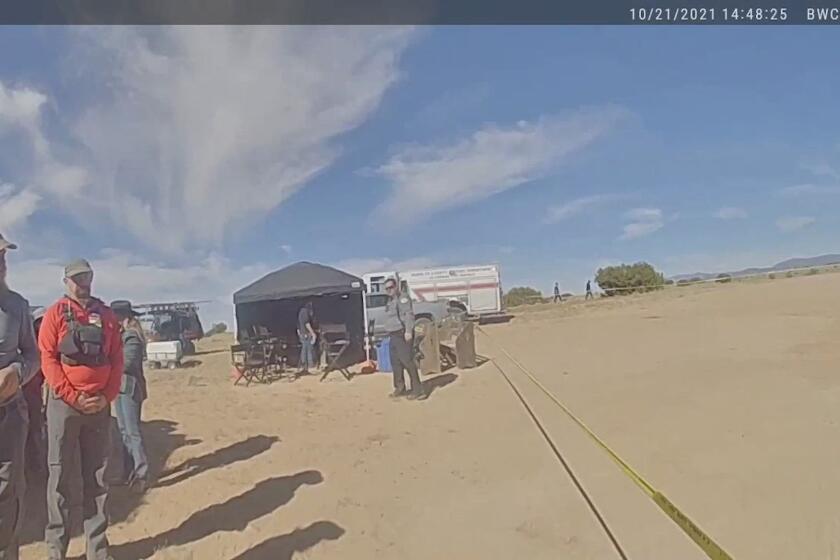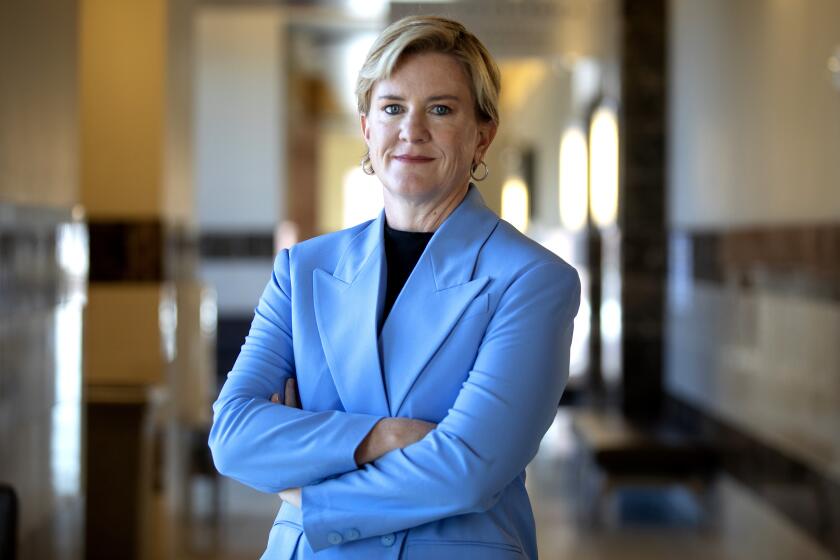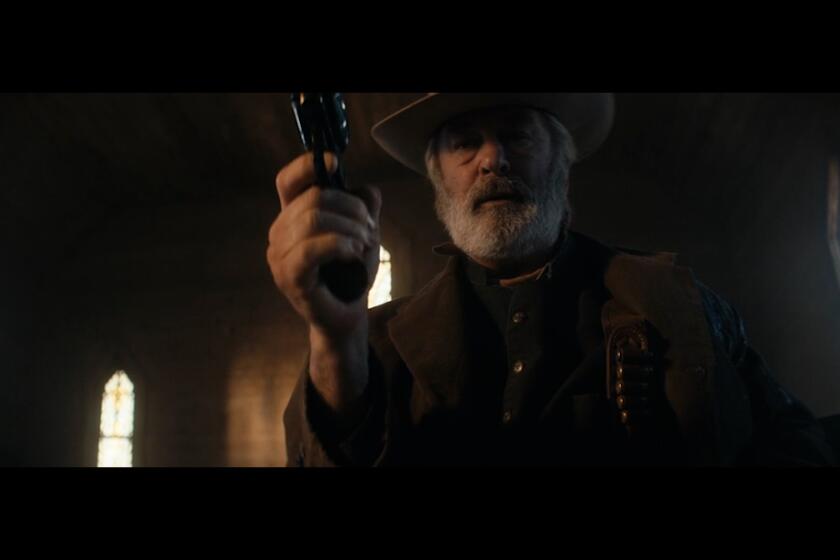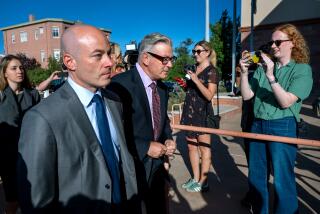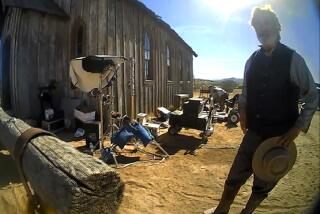‘Rattled with guilt,’ assistant director David Halls convicted for role in ‘Rust’ shooting
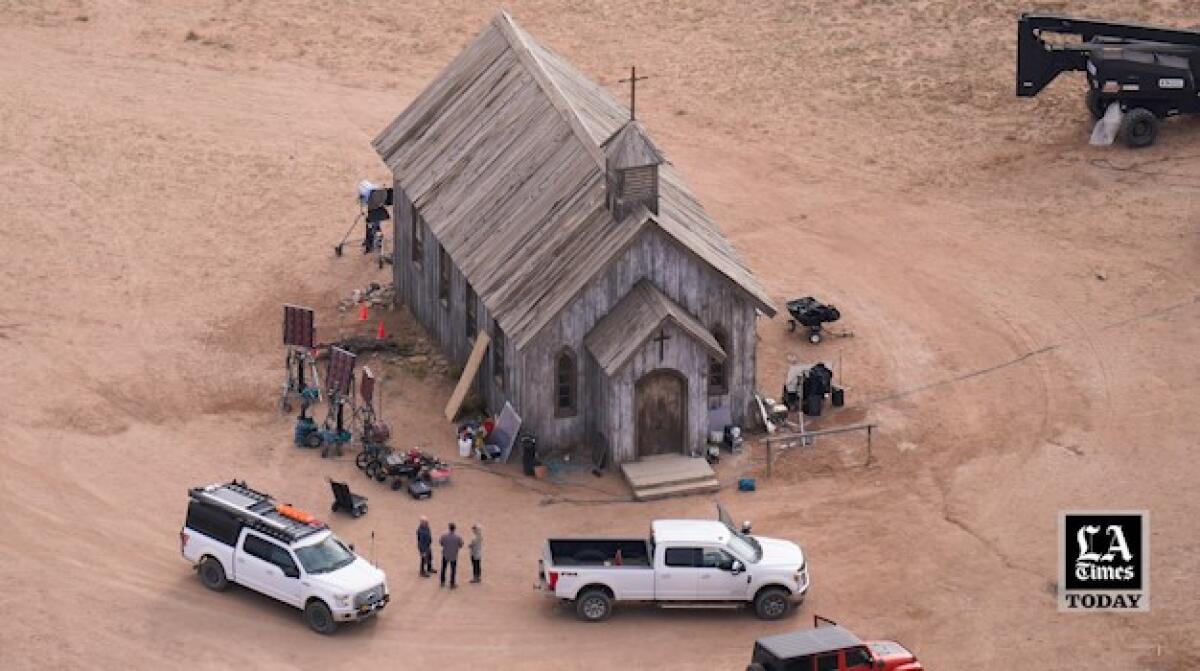
“Rust” assistant director David Halls was convicted Friday of one count of negligent use of a deadly weapon for his role in the accidental shooting death of cinematographer Halyna Hutchins on the set of the low-budget western.
At a virtual court hearing, Halls told New Mexico 1st Judicial District Court Judge Mary Marlowe Sommer that he agreed to plead no contest to the misdemeanor charge.
With Halls’ plea, New Mexico prosecutors have secured one conviction in the criminal cases stemming from Alec Baldwin’s Oct. 21, 2021, shooting of Hutchins on the movie set near Santa Fe, N.M. The film’s director, Joel Souza, was wounded.
Sommer gave Halls — the person who handed Baldwin the loaded firearm — a suspended six-month sentence of unsupervised probation. Halls has agreed to pay a $500 fine, participate in a firearms safety class, refrain from taking drugs or alcohol and complete 24 hours of community service.
Halls’ conviction was expected. He entered a plea deal with prosecutors in January, which the judge has now accepted.
Halls’ Albuquerque-based attorney, Lisa Torraco, told the judge that Halls is still haunted by the tragedy. He was standing just three feet from Hutchins and Souza when they were shot. Torraco has maintained that despite Halls’ role as on-set safety coordinator, he was not responsible for the actions of others.
“He, like many others, is extremely traumatized and just rattled with guilt and so many other feelings of: What could I have done better? How could I have changed things?” Torraco told the judge.
The conviction may provide a boost for the beleaguered prosecution team, which has suffered numerous setbacks since charging Baldwin and armorer Hannah Gutierrez Reed with two counts of involuntary manslaughter two months ago. Both have entered not guilty pleas.
Santa Fe’s top prosecutor — 1st Judicial Dist. Atty. Mary Carmack-Altwies — stepped down this week after Gutierrez Reed’s lawyers challenged her involvement. They argued that the law did not allow the D.A. to participate while a special prosecutor also served on the case.
Carmack-Altwies earlier in the week told the judge that she needed assistance from a special prosecutor because her office has been struggling with a high number of attorney vacancies. Sommer rejected Carmack-Altwies’ attempt to stay involved while handing off some duties.
Friday’s virtual court hearing marked the first appearance by the new special prosecutor in the case, Kari T. Morrissey, an Albuquerque litigator who stepped into the sprawling criminal proceedings on Wednesday. She and her law partner, Jason Lewis, replaced Carmack-Altwies.
“This case has taken some interesting turns,” Joshua Kastenberg, a law professor at the University of New Mexico, said this week in an interview. “It shouldn’t be a problem with these two new attorneys picking up the case ... and it might help the prosecution overcome some of the image problems — the stains from earlier mistakes.”
Carmack-Altwies was the second ranking prosecutor to resign from the case.
Baldwin’s attorneys had protested the involvement of special prosecutor Andrea Reeb because she also is a member of the New Mexico Legislature. The veteran prosecutor from rural New Mexico had joined the case last summer in the middle of her campaign for public office but stepped down in mid-March.
In a then-private email last June, Reeb asked Carmack-Altwies to publicize Reeb’s role in the Baldwin case, joking “it might help in my campaign lol,” according to Baldwin’s court filings.
Baldwin’s attorneys alleged the Republican lawmaker’s involvement in the case was politically motivated, which Reeb adamantly denied. In some conservative circles, Baldwin, who famously satirized former President Trump on NBC’s “Saturday Night Live,” is reviled.
Prosecutors also blundered in their initial charges.
Carmack-Altwies hit Baldwin and Gutierrez Reed with additional “firearms enhancement” charges, which her office said would carry mandatory five-year prison sentences if convicted. Baldwin’s attorneys pointed out that the law mandating five-year sentences wasn’t on the books when Hutchins was shot. Carmack-Altwies quickly withdrew the charges.
If found guilty, Baldwin and Gutierrez Reed face sentences of up to 18 months.
‘Rust’ assistant director David Halls has agreed to testify in criminal cases brought by the prosecution. “Maybe his testimony will be more helpful to Mr. Baldwin,” Halls’ attorney said.
On Friday, Sommer told Halls that he is not permitted to have contact with Baldwin, Gutierrez Reed or any witnesses in the case. The 63-year-old film veteran — who has retired from the industry — must testify truthfully should he be called as a witness for the prosecution or the defense.
Morrissey, summarizing New Mexico’s case, noted that Halls was the “Rust” safety coordinator and there had been two accidental gun discharges the weekend before Hutchins was fatally shot.
There also were labor tensions on set. The film’s “camera crew had walked off the production the day before [the tragedy] due to safety concerns, among other issues,” Morrissey said.
New Mexico’s criminal case against Alec Baldwin and armorer Hannah Gutierrez Reed in the fatal “Rust” shooting suffered another setback this week.
Camera crew members had previously told The Times they felt producers were cutting corners in a rush to film the low-budget western in 21 days.
The “Rust” producers have denied any wrongdoing.
In a resignation email to production managers the night before the fatal shooting, one camera crew member wrote he felt “anxious on set.”
“I’ve seen first hand our AD [Halls] rush to get shots and he skips over important protocols,” Jonas Huerta, the digital utility technician, wrote in the Oct. 20, 2021, email, which was viewed by The Times. “Sometimes he rushes so quickly that [a] props [department member] hasn’t even had the chance to bring earplugs and he rolls and the actors fire anyway.”
After lunch the following day, Baldwin, Hutchins, Souza, Halls and others gathered for a rehearsal in the old wooden church at Bonanza Creek Ranch, a popular movie location south of Santa Fe. Hutchins wanted Baldwin to practice a “cross-draw” maneuver. The Hollywood actor pulled the Colt .45 out of his holster, then pointed it at the camera.
Minutes before, Gutierrez Reed, the weapons handler, had brought the gun into the church. She handed it to Halls, telling him it was loaded with so-called dummy rounds, Morrissey said.
“Now the protocol at this point in time is for Mr. Halls to check and confirm,” Morrissey said. “He’s kind of the last line of defense.”
Halls has conceded that he did not recheck the bullets in the gun’s chamber.
“He then handed the gun to Mr. Baldwin,” Morrissey said.
The documents include a 204-page case report summarizing the investigation, which remains open and ongoing.
Baldwin has said he cocked the hammer but that he didn’t pull the trigger. The gun fired, discharging a bullet that traveled through Hutchins’ chest. The bullet lodged in Souza’s shoulder.
Halls’ attorney Torraco told the judge that Halls was grappling with “survivor’s guilt.”
“Never in anyone’s wildest dreams ... would anyone think there could possibly be a live round in the firearm,” Torraco said, noting that Halls agreed to plead no contest “so that he can get this [criminal case] over with” for his sake and to spare Hutchins’ family from a protracted criminal proceeding.
“The one way that he can do that, and not make this any more painful than it absolutely has to be, is to come in early, to address it with the court and to close his case,” Torraco said.
More to Read
Inside the business of entertainment
The Wide Shot brings you news, analysis and insights on everything from streaming wars to production — and what it all means for the future.
You may occasionally receive promotional content from the Los Angeles Times.
